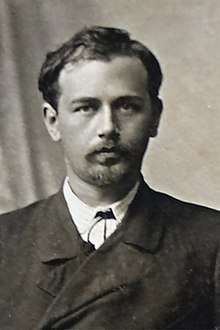Shchedryk (song)
"Shchedryk" (Ukrainian: Щедрик, from Щедрий вечiр, "Bountiful Evening") is a Ukrainian shchedrivka, or New Year's song, known in English as "The Little Swallow". It was arranged by composer and teacher Mykola Leontovych in 1916, and tells a story of a swallow flying into a household to sing of wealth that will come with the following spring. "Shchedryk" was originally sung on the night of January 13, New Year's Eve in the Julian Calendar (December 31 Old Style), which is Shchedry Vechir. Early performances of the piece were made by students at Kyiv University.[1]
"Shchedryk" was later adapted as an English Christmas carol, "Carol of the Bells", by Peter J. Wilhousky following a performance of the original song by Alexander Koshetz's Ukrainian National Chorus at Carnegie Hall on October 5, 1921. Wilhousky copyrighted and published his new lyrics (which were not based on the Ukrainian lyrics) in 1936, and the song became popular in the United States and Canada, where it became strongly associated with Christmas.
Conceptually, the Ukrainian lyrics of this song meet the definition of a shchedrivka, while the English content of "The Little Swallow" identifies it as a kolyadka or, in other words, a Christmas carol.
Origins and translation

The song is based on a traditional folk chant whose language was thought to have magical properties. The original traditional Ukrainian text used a device known as hemiola in the rhythm (alternating the accents within each measure from 3/4 to 6/8 and back again). The chant based on an ostinato four-note pattern within the range of a minor third is thought to be of prehistoric origins and was associated with the coming New Year which in Ukraine before the introduction of Christianity was originally celebrated in April.
With the introduction of Christianity to Ukraine, the celebration of the New Year was moved from April to January and the holiday the chant describes became associated with the Feast of Epiphany also known in Ukrainian as Shchedry vechir. The songs sung for this celebration are known as Schedrivky.
The original Ukrainian text tells the tale of a swallow flying into a household to proclaim the plentiful and bountiful year that the family will have."[2] The title is derived from the Ukrainian word for "bountiful".
In Ukraine, the song is currently sung on the eve of the Julian New Year (January 13).
The four-note melody over a minor third of the chant was used by Ukrainian composer Mykola Leontovych as an ostinato theme in a number of arrangements he made. The arrangement for mixed voice choir a cappella was popularized by the Ukrainian Republic Capella directed by Oleksander Koshetz when it toured the West after 1920.
The first of the English language lyrics to "Carol of the Bells" (a song based on the same melodic ideas) were written in 1936 by Peter Wilhousky of NBC Radio. The song reminded Wilhousky of beautiful ringing bells and he captured that imagery in his lyrics. There is also an English adaptation of the original Ukrainian by Stepan Pasicznyk. Several other variants of English words with the same melody, mostly retaining Wilhousky's bell theme. One of the better-known variants is a 1947 set of lyrics with more explicitly Christian lyrics "Ring, Christmas Bells."[3]
Comparison of lyrics
Although Carol of the Bells and Shchedryk share the same melody, the lyrics of these two songs have nothing in common.
| Ukrainian lyrics to Shchedryk | Transliteration (BGN/PCGN) | English translation |
|---|---|---|
Щедрик щедрик, щедрiвочка, |
Shchedryk shchedryk, shchedrivochka, |
Shchedryk, shchedryk, a shchedrivka [New Year's carol]; |
See also
References
- "Carol of the Bells". Archived from the original on March 28, 2012. Retrieved 2015-12-23., Sean Spurr, Carols.co.
- Quote from Rice University News
- Nobbman, Dale V. (2000). Christmas Music Companion Fact Book: The Chronological History of Our Most Well-Known Traditional Christmas Hymns, Carols, Songs And the Writers & Composers Who Created Them. Centerstream Publishing: Anaheim Hills, CA. p. 91. ISBN 1574240676.
